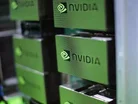Nvidia to release chips to avoid US-China importing ban

Semiconductor and technology leader Nvidia is planning to release three new chips for the Chinese market, weeks after the US government blocked the company from selling two high-end AI chips and one of its top gaming chips to Chinese firms.
The three new chips, called the HGX H20, L20 PCIe, and L2 PCIe, could be announced as early as 16 November, according to a report by Reuters.
In October, the US updated its export restrictions to curb sales of Nvidia's A800 and H800 chips to China, as part of its efforts to restrict China's access to advanced semiconductor technology. It was also reported that one of the company’s top gaming chips, L40S, would be affected.
Nvidia's stock price then took a sharp dive after the new restrictions were imposed on the sale of AI chips to China, including chips designed specifically for the Chinese market.
The US-China tech rivalry
In August 2023, US President Biden imposed new export controls on China, aimed at restricting its development of surveillance technologies and tightening regulations in key industries such as AI, semiconductors, and quantum computing.
The move was likely to have a significant impact on global business, as other countries have warned that severe restrictions could damage their economies. The US-China tech rivalry is heating up, with semiconductors and AI emerging as key battlegrounds.
Billions of orders to be affected
Due to the new US export control rules, Nvidia is now unable to ship its flagship RTX 4090 gaming graphics card to China. Nvidia has said that it does not expect to see a financial impact from the restrictions in the short term, but reports suggest that it may have to cancel billions of dollars in orders from Chinese tech firms.
Nvidia has dominated China's US$7bn AI chip market with over 90% share, but analysts say US restrictions could help provide opportunities for players such as Huawei Technologies.
Earlier this week, reports surfaced that Chinese internet search giant Baidu had ordered 1,600 of Huawei's 910B Ascend AI chips, which were developed as an alternative to Nvidia's A100 chip, for 200 servers.



